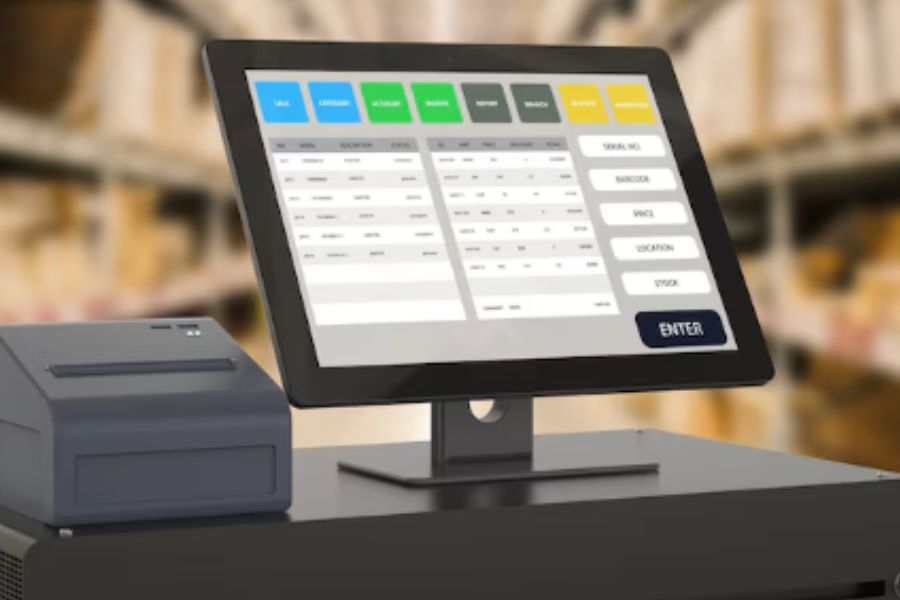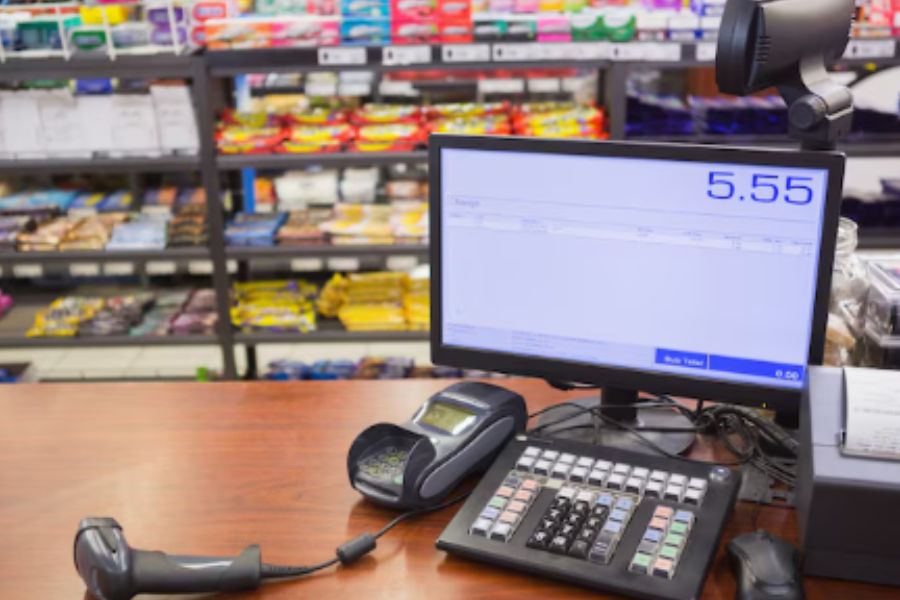As e-commerce and retail evolve, real-time logistics have become essential for competitiveness. In 2023, 67% of customers expected same-day or next-day delivery, yet many businesses still use outdated, fragmented systems. POS machine manufacturers now serve as strategic hubs, linking sales, inventory, logistics, and customer service.
This blog explores how POS-driven distribution automation can transform logistics, featuring technical insights and a practical implementation checklist.
Highlight:
- POS for machine manufacturers acts as a centralized system that connects sales, inventory, and fulfillment processes across production and distribution channels.
- It supports distribution automation by syncing real-time order data with logistics workflows, reducing manual tasks and accelerating delivery accuracy.
What Distribution Automation Looks Like Today
Distribution automation is revolutionizing the power distribution sector by enhancing efficiency, reliability, and integration capabilities within electrical grids. As of 2024, the market has experienced substantial growth, driven by technological advancements and the increasing demand for smart grid solutions.
According to industry reports, the distribution automation market was valued at USD 15.7 billion in 2022 and is projected to reach USD 39.71 billion by 2030, growing at a compound annual growth rate (CAGR) of 12.3% over the forecast period of 2023-2030.
Key trends include:
- Adoption of Smart Grid Solutions: Utilities are increasingly implementing advanced communication and control technologies to optimize distribution networks. These smart grid solutions strengthen grid resilience and enable real-time monitoring and management of assets, facilitating the integration of renewable energy sources and accommodating evolving energy demands.
- Emergence of Cloud-Based Distribution Management Systems (DMS): Cloud-based DMS solutions offer utilities greater flexibility, scalability, and cost-effectiveness compared to traditional on-premises systems.
- Integration of Distributed Energy Resources (DERs): The integration of DERs, such as solar and wind power, into distribution networks is becoming more prevalent. Distribution automation facilitates the seamless incorporation of these resources, enhancing system reliability and promoting sustainable energy practices.
Key Components:
- Remote Fault Indicators and Smart Relays: These devices detect and isolate faults in the distribution network, improving response times and minimizing outage durations
- Automated Switches and Reclosers: They enable automatic reconfiguration of the network to maintain service continuity during faults.
- Voltage Regulators and Capacitor Banks: These components help maintain voltage levels within desired ranges, ensuring power quality and efficiency.
While distribution automation offers numerous benefits, challenges such as high initial investment costs and the complexity of integrating new technologies with existing infrastructure remain. However, the rise of smart cities and industrial automation presents opportunities for advanced distribution automation solutions to manage complex energy systems in urban areas and large-scale industrial operations.
Why POS Systems Matter for Automated Distribution
Modern POS systems have evolved into central hubs for automated distribution. They now handle far more than sales, they coordinate order capture, fulfillment, and real-time data sharing across departments.
- Real-time order capture: Smart POS systems record and sync orders across in-store, online, and mobile platforms in real time. This shortens the time between order placement and fulfillment, reducing delays that often come from manual reconciliation.
- Automation: Automating routine tasks such as data entry, stock updates, and invoice generation, POS systems minimize human error. This not only improves data accuracy but also frees up staff for higher-value activities, leading to smoother operations and improved workflow integrity.
- Faster approval and processing: Through inventory checks and sending authorizations, a smart POS speeds up and simplifies every step of the order process. Approval chains can be customized, and actions triggered automatically, allowing businesses to maintain speed without sacrificing accuracy or control.
- Clearer visibility into order status, inventory, and delivery timelines: POS systems offer real-time dashboards and tracking tools that give both staff and customers full transparency. Businesses can monitor where an order is, how much inventory is available, and when items are due for delivery or restock, improving communication and cutting uncertainty.
- Smarter cost control through connected workflows: With sales, inventory, procurement, and logistics linked in one platform, businesses can track operational costs more precisely. Detecting inefficiencies or overstock situations becomes easier, making it simpler to adjust and protect margins.
- Built-in compliance tracking and reporting: For industries with strict regulations, such as pharmaceuticals, perishables, or firearms, POS platforms can automate compliance reporting. This includes audit logs, expiry tracking, and traceability, removing the need for manual documentation.
- Better vendor relationships: A POS system with supply chain integration enhances coordination with suppliers and logistics partners. Real-time data sharing, automated order notifications, and vendor performance analytics foster stronger relationships, decreased lead times, and smoother replenishment cycles.
- Seamless integration with ERP, inventory, and logistics tools: Modern POS solutions are the digital bridge between multiple systems, including ERP, inventory management, and third-party logistics. These integrations allow for automated data flow, ensuring that all parts of the business are working with consistent, up-to-date information.
- Support for demand forecasting: With accurate, real-time sales and inventory data, businesses can forecast demand more effectively. This reduces overstock, avoid stockouts, and plans promotions around actual buying patterns.
- Scalability without complexity: As businesses grow, adding new locations or sales channels doesn’t require overhauling infrastructure. A centralized POS system can scale with the business while keeping distribution workflows consistent.
Leveraging POS Machine Manufacturers for Real-Time Order Management
In retail and hospitality, POS machine manufacturers now play an active role in enabling real-time order coordination. Their focus has shifted from building basic payment terminals to creating intelligent devices that sync seamlessly with sales, inventory, logistics, and customer service systems. This shift supports faster processing, fewer manual errors, and more consistent service, especially in environments where speed and accuracy drive customer satisfaction.
Capturing and processing orders instantly at the point of sale
POS machine manufacturers have transformed how businesses capture transactions by enabling instant, system-wide communication the moment a sale occurs. For instance, in a restaurant using Supy POS, an order placed at the counter is immediately sent to the kitchen, inventory is updated, and a digital receipt is generated in real time.
This kind of automation shortens fulfillment cycles, reduces miscommunication, and improves the overall customer experience. Retailers benefit similarly through instant stock deductions and synchronized updates across systems.
Syncing data with inventory and fulfillment systems to avoid delays
One of the key contributions of POS machine manufacturers is their focus on hardware-software compatibility. High-end POS are now designed to work seamlessly with inventory management systems, warehouse tools, and enterprise resource planning (ERP) platforms.
This level of compatibility keeps all departments aligned and ensures that every transaction updates stock levels instantly. Real-time syncing reduces the risk of stockouts, incorrect shipments, and misaligned data between sales and fulfillment teams. As a result, businesses can maintain more accurate forecasting and replenishment cycles, which is especially important in high-turnover industries like fashion, food, or electronics.
Automating routine tasks to eliminate bottlenecks
POS machine manufacturers are embedding automation capabilities directly into their hardware and software. Features like automatic invoicing, real-time tax calculations, live reporting, and inventory alerts help businesses reduce reliance on manual processes.
This shift not only speeds up operations but also reduces common errors tied to human input. As a result, teams can focus more on customer engagement and exception handling instead of repetitive administrative tasks.
Handling high-volume orders without compromising speed or accuracy
High-traffic businesses demand POS systems that can handle thousands of orders daily without lag, error, or downtime. To meet these expectations, POS machine manufacturers like Elo, Sunmi, PAX Technology, and software innovators like ConnectPOS have stepped up with powerful solutions designed for performance and reliability.
These manufacturers and providers are engineering systems with multi-core processors, industrial-grade durability, and advanced networking capabilities that ensure transactions are processed seamlessly even during peak hours. These high-performance, rugged POS terminals are vital for businesses of all sizes, from bustling grocery chains to stadium concession kiosks and airport retail stores, to confirm that they can operate at a high level of speed and accuracy.
ConnectPOS offers a strong example of this performance in action. As a cloud-based POS solution compatible with top POS hardware, it supports high-volume transactions, offline operations, and omnichannel syncing. Even during high-traffic events like Black Friday, retailers using ConnectPOS have reported processing hundreds of transactions per minute without inventory mismatches or checkout delays.
ConnectPOS: A Case Study in Real-Time POS Automation
ConnectPOS is a real-time POS solution tailored for businesses that require precision, scalability, and system-wide visibility, especially manufacturers with complex distribution workflows. Its infrastructure supports not only high-volume, multi-location retail but also manufacturing operations that depend on accurate inventory tracking, supply chain coordination, and seamless order processing.
Manufacturers benefit from ConnectPOS in several ways:
- Real-Time Synchronization Across Sales and Production
- Multi-Warehouse and Multi-Store Management
- Logistics API Integrations for Faster Fulfillment
- Integration with Major eCommerce and ERP Platforms
- Customizable Automation Rules for Fulfillment
- Offline Mode with Full Functionality
- Omnichannel Support for B2B and DTC Models
For retailers seeking to scale, ConnectPOS is a robust partner in building an automated distribution ecosystem.
FAQs: POS Machine Manufacturers
- Can small businesses benefit from POS-driven automation?
Yes, it streamlines inventory, reduces manual errors, enhances customer experience, and saves time, making operations more efficient and scalable.
- What are the risks of automating order management, and how can they be mitigated?
Risks include system downtime and data inaccuracies; mitigation involves regular software updates, backups, and using reliable, well-supported POS systems.
- How does AI enhance POS functionalities for distribution automation?
AI improves demand forecasting, automates reordering, optimizes logistics, and enables predictive maintenance, increasing overall efficiency and accuracy in operations.
Conclusion
POS machine manufacturers play a direct role in streamlining distribution by building systems that connect sales, inventory, and logistics in real time. Their hardware and software solutions support high-volume order processing, reduce delays, and improve coordination across fulfillment channels. For businesses managing complex operations, especially those in retail, hospitality, or manufacturing, working with the right POS machine manufacturers can lead to faster order cycles, better data accuracy, and stronger supply chain control.
Looking to optimize your operations? Contact ConnectPOS for a powerful, scalable solution tailored to modern distribution needs.



